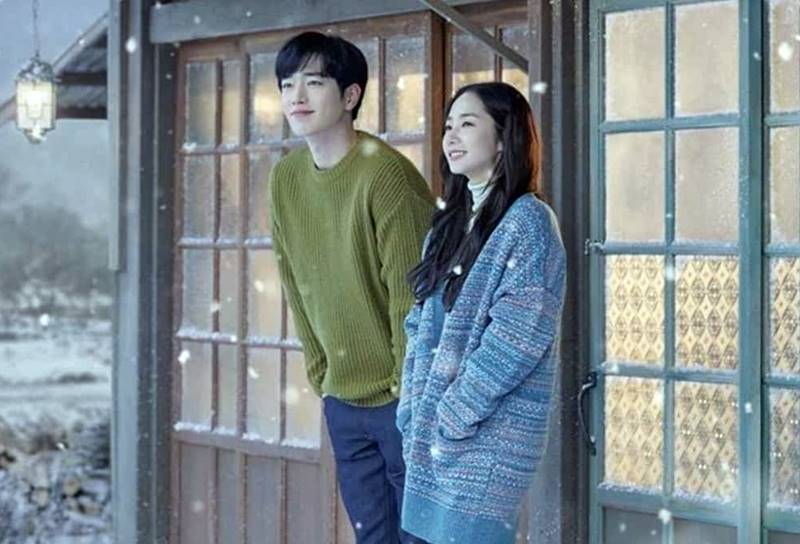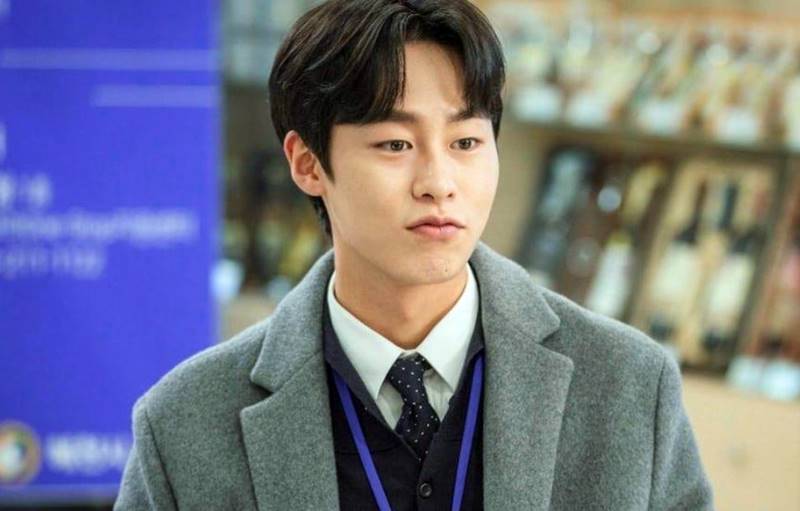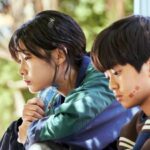
By Jae-Ha Kim
jaehakim.com
April 29, 2020
☆☆☆☆
Mok Hae-Won (played by Park Min-Young)
Im Eun-Seob (played by Seo Kang-Joon)
Lee Jang-Woo (played by Lee Jae-Wook)
↑Note: Korean names denote the surname followed by the given name.
“When the Weather is Fine” starts off slowly — almost to the point of being sluggish — which is why it took me two days to finish the first episode. I didn’t stop watching, though, because the cast is first rate and I wanted to know more about the characters’ back stories.
Most of the things I want to write about are about elements of surprise, so I’ll add some of my thoughts in the Spoiler Alert below. But what I can say is that this series is a beautiful and nuanced look at the after effects of childhood (and adult) trauma. It’s not something that one simply outgrows. It’s something they have to figure out how to live with every day, along with the sorrow that accompanies their memories.
Park Min-Young and Seo Kang-Joon are both skilled actors, whose expressions convey the complicated emotions their characters have. Neither had an easy life and they are almost fearful of expecting — or even wanting — more than what they have.
Some of the sweetest elements of this 16-part series had nothing to do with the romance between the lead couple, but rather the camaraderie between the people in the village. Like the neighbors in “Reply 1988” or the North Korean villagers in “Crash Landing on You,” it’s the human connection that drives this K-Drama. They come together to harvest rice, share snacks and search for missing hikers. The weekly bookclub held at Eun-Seob’s bookstore is a meeting of a diverse array of people, who have their own stories to share as they discuss the topic at hand. It’s the kind of bookclub I wish existed in my neighborhood.
Eun-Seob and Hae-Won went to high school together. In their own ways, both were outcasts whose paths intersected at various points. While Hae-Won moved to Seoul for school and to teach spoiled children how to play the cello, he stayed behind near his parents and younger sister, Hwi. Played by the effervescent Kim Hwan-Hee, Hwi is a spirited teen whose grades are horrible, but she’s OK with that. She has a crush on the smartest boy in school, who is willing to put up with her shenanigans if she’ll allow him to join their bookclub.

As Eun-Seob’s best friend, Jang-Woo, Lee Jae-Wook provides much-needed comic relief. At just 21 years old, Lee has come into his own, with prime roles in a string of K-Dramas: 2018’s “Memories of the Alhambra” and 2019’s “Search: WWW” and “Extraordinary You.” He is versatile and such a delight. KBS recently announced that he and Go Ara will star together in the K-Drama “Do Do Sol Sol La La Sol” (slated to air near the end of this year).
There are so many things going on in “When the Weather is Fine” and the twists and turns are deftly handled. The plot includes a murder mystery, domestic abuse and lies covering up truths that made everything worse. The ending isn’t the decisive kind of finale that some people may want. But it’s realistic and satisfying, because it offers glimpses of hope.
Airdates:
JTBC aired 16 hour-long episodes from February 24 to April 21, 2020.
Spoiler Alert:
Early on, we see that Hae-Won’s mother, Myeong-Joo, was imprisoned for killing her abusive husband. She was sentenced to seven years. What we don’t find out until the later episodes is that her younger sister, Myeong-Yeo, is the one who inadvertently killed him. She caught him beating Myeong-Joo and intervened. He beat her, too. While trying to escape in Myeong-Joo’s car, she accidentally crushed him to death. Myeong-Joo tells her sister to let her take the fall. The police would go easy on her, she said, since she was a victim of domestic violence. But if they knew it was Myeong-Yeo, they would throw her in prison for decades for murder.
While Myeong-Joo was trying to protect her sister, what she didn’t realize at the time was that the guilt would gnaw away at Myeong-Yeo. When she has health issues, she refuses to get treated at the hospital. She seems to want bad things to happen to her, because she hasn’t been punished for the crime she committed.
What was interesting was to watch them go through their grieving process. Even though he had been an abusive asshole, Myeong-Joo still visits his grave on his birthday. When Myeong-Yeo refers to him, she uses honorifics and calls him brother in law (rather than motherfucker).
For whatever reason, Myeong-Joo thought it was best if she cut off all ties with Hae-Won, who was still a teenager at the time her father died. Hae-Won is sent to live in the countryside with her grandmother and her Aunt Myeong-Yeo. She finds a best friend in Bo-Young (Im Se-Mi). She confides in Bo-Young about her family’s complicated past and feels betrayed when Bo-Young tells another classmate, who then spreads rumors about Hae-Won.
In the clumsiest plot line of the series, Bo-Young spends an inordinate amount of time trying to make Hae-Won forgive her — and trying to make Eun-Seob fall in love with her. But it’s the strained relationship between the two women that is responsible for the series title. When Bo-Young wants to talk about the misunderstanding, Hae-Won stalls her by saying it’s winter now, but she’ll see her when the weather is fine. At the end of the series, Bo-Young receives a text message, presumably from Hae-Won, saying that the weather is nice now.
I have mixed feelings about the secret that Bo-Young blabbed. On the one hand, she revealed something sacred and precious. On the other hand, she was a teenager who thought she was protecting Hae-Won from nasty rumors that she had moved from Seoul because she had been pregnant. She told their classmate that wasn’t true — it was because her mother had killed her father. But as Hae-Won pointed out, she could’ve withstood that kind of gossip because she knew it wasn’t true. That said, it’s difficult for adults to contain secrets. It would be almost impossible for a teenager to maintain that kind of secret — and I’m not sure a child is mature enough to process that kind of information.
As for Eun-Seob, his mother left the family when he was a youngster. His father raised him by himself deep in the woods with no neighbors. After his father’s death, Eun-Seob was taken in by a couple. The wife was already pregnant at the time (with Hwi). Adoption and the concept of who is and isn’t someone’s real family are brought up repeatedly throughout this series, often in front of Eun-Seob, who accepts that he isn’t a real child in the same way that Hwi is to her biological parents. When his father tells the local villagers that they should stop calling Eun-Seob to search the mountains for people who are lost, one of them says, “What does it matter? It’s not like he’s your real son. He’s just some stray you picked up on the side of the road.” Overhearing this, Eun-Seob doesn’t get angry at the man. Rather, he seems apologetic to his father … that his father doesn’t have a real son.
I loved his overly protective adoptive mother, who challenged anyone to dare say Eun-Seob wasn’t her real son. She said when they brought him into their household, and Hwi was born shortly afterwards, she lavished more attention on him than her daughter, because she felt she needed to compensate for his having lost his birth parents. But as time went on, she realized she did love him more than Hwi. I didn’t take that to mean that she loved Hwi any less, but that she thought of him not as her adopted son — but her son.
© 2020 JAE-HA KIM | All Rights Reserved






I loved this drama but thought something about the ending was too rushed. Nothing seemed really resolved between Hae-won and her mom and her aunt. No real forgiveness no real apologies. Just kind of swept under the rug like always and it seemed so cold that she would run away from him knowing how wounded he had been. She just comes back and it’s all good?